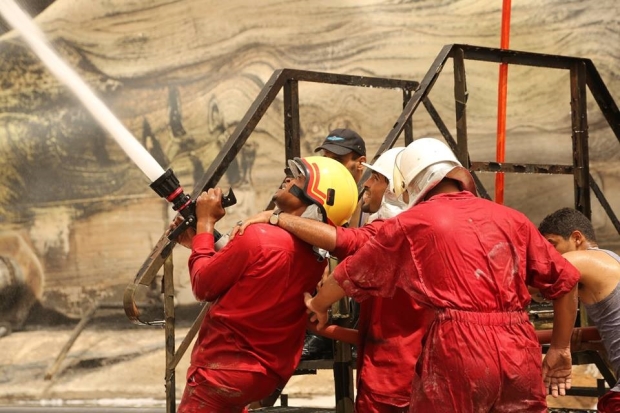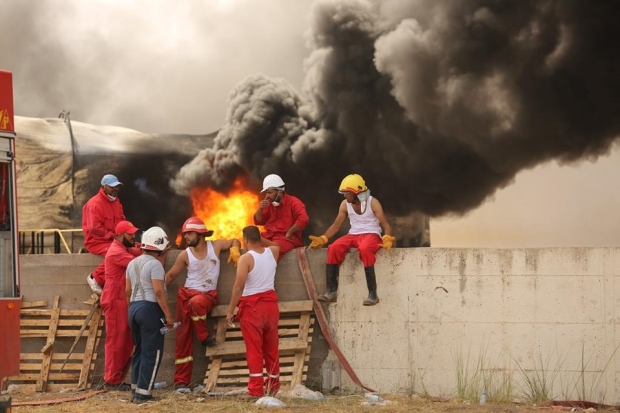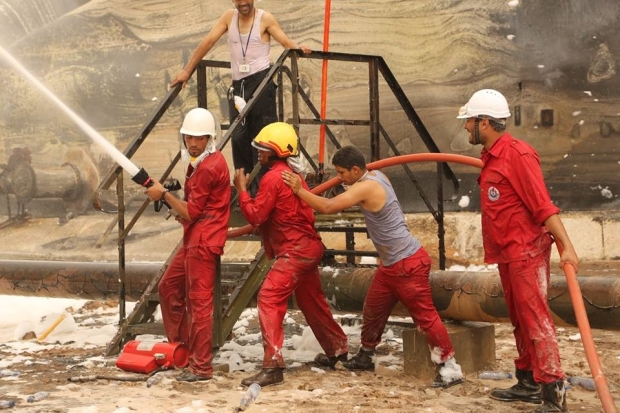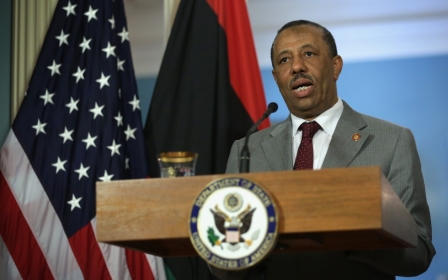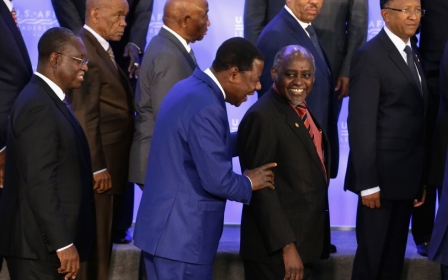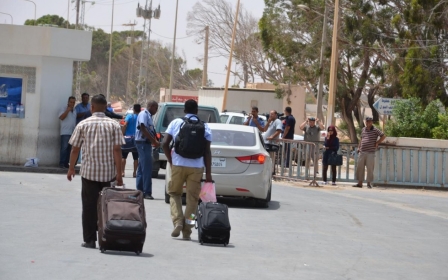Battle for Tripoli continues despite calls for ceasefire
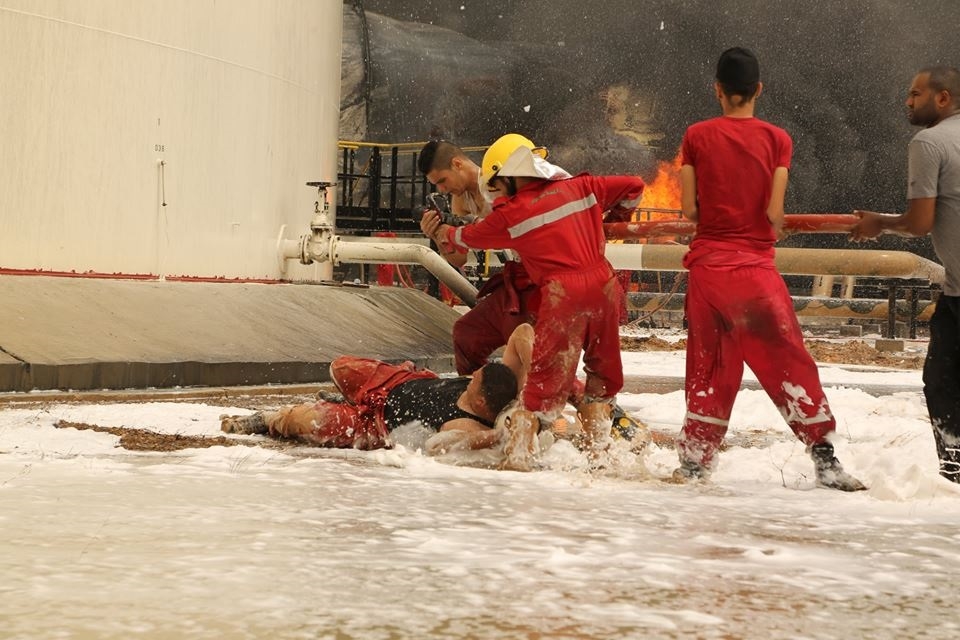
TRIPOLI - “The sound of our GRAD missiles and tank shells firing is like Beethoven to my ears,” says Abdulmola, waving his hands dramatically in the air like a conductor.
Abdulmola is a young, eager field commander in Zintan’s anti-Islamist Qaqaa militia. After a long night of fighting, his men are tired but Abdulmola urges them on.
“If you want to rest now, that’s fine,” he said, “but you will die later”.
He demands that that his men must get a move on and prepare for an attack they all know is coming.
The incoming onslaught will be lead by the Islamist-inspired militias from rival Misrata that are battling Zintan forces across Libya.
“Load the guns and refuel the cars,” Abdulmola shouts. “The last thing I need is to come under attack and have you all standing with your mouths open not knowing what to do.”
The two militias rose to prominence for their fight against former Libyan leader Mummar Gaddafi back in 2011, but both have long since turned the guns on one another.
“They fire all their heavy ammunition at us, but as you can see they are bad at aiming,” says Abdulmola, as he points to the militia’s camp court yard, which is filled with tanks and anti-aircraft machine guns but shows no sign of damage.
“Their rockets and missiles just land on civilian houses,” he says.
The Zintanies claim the Misratan militias are Islamists, while the Misratans claim the Zintanies are remnants of the old Gaddafi regime. Both forces insist that they represent the true Libyan national army.
But, with national security at stake and civilian houses being damaged by either side, neither camp is prepared to stop the fighting or lay down its arms. Everything from airports, schools, mosques has long since been damaged in the crossfire as the unprofessional militia war continues and the two sides battle for control of the country’s capital.
Targeting Tripoli
Fierce battles have now raged for weeks in the troubled Libyan capital, which has seen many key sites fall victim to the fighting.
In late July, the Brega fuel depot - the largest fuel and gas storage site in Tripoli - became the latest to grab headlines as images of flames spewing from the fuel tanks came to dominate the southern skyline.
The facility lies on the contested airport road, sandwiched between the Zintan-controlled Tripoli International Airport, and the Misrata-controlled capital. The airport, Libya’s biggest, has seen some of the fiercest fighting in recent weeks and has been forced to close.
After last months’ battle at the airport, Brega seemed like an almost natural follow-up target and it was no surprise to see the depot caught in the crossfire.
Since it was first attacked, the flames have kept on burning - the fires constantly reignited by more gunfire and shelling that bears down on the depot every time fire-fighters come near to putting it out.
Akram Almeghri works at Libya’s National Oil Cooperation (NOC) and was one the first people to go and try put out the blaze.
“It was crazy, dealing with highly flammable substances and having militias firing at us,” he says, while explaining that control over the site keeps switching, making the clear-up and containment process even harder.
“A few days ago it was the Zintanies, and now the Misratans have it,” says Akram.
The road to Brega
On Thursday, we accompanied Akram on his dangerous journey to the depot. Despite the perils, he had volunteered to go and test air composition in and around the fuel tanks for the NOC, despite the area now being seen as the main front line of militia war in Tripoli.
“We have to check how bad the contamination from the smoke is,” says Akram.
The airport road is the main route to the fuel storage site but the motorway has been sealed off with sand barriers and car remnants, which lie scattered on the once busy route.
Instead, to reach the depot, one has to circumvent the main road and drive down a dirt path, parallel to the main road.
“It’s not that the militias don’t know this road,” Akram explains. “But it’s the only way in and out that offers a little bit of safety.”
When we arrive, Brega is being guarded by two Misratan militia cars that are parked outside the main gate. Zintan forces meanwhile hide out nearby in a small ally just off the main road.
The Misratan pickup trucks are mounted with anti-aircraft machine guns, poised and aimed west at Zintan locations.
“Don’t go in! A sniper has shot one of the workers,” one of the Misrata militiamen warns.
He is quick to blame a group of Zintan militiamen, stationed in a building across the road, for the barrage of bullets that periodically fly in their direction.
But, with tensions high, it is not always clear what has really transpired.
Firemen and workers quickly rush out to inspect the new NOC arrival, and counter the militiamen’s claims. “No one was hurt,” says, Ahmed one of the firemen at the site.
One worker was shot at, but the bullet merely whistled past his leg and tore his trousers, he explains. “He was lucky,” Ahmed adds.
“The fire is almost out,” says Akrum, “that’s why they are shooting at it”.
The Zintanis and the Misratans have both recently battled over the depot but it seems that both militias have similar designs for the plant.
They both want to hold it, and hope that their rivals will exhaust their resources trying to regain Brega, yet neither is really willing to go all out to cement their control the site.
Only a few Misratan troops now guard the site, and it appears as though their main aim is to keep drawing Zintan fire. Despite the flames, most of the men sit calmly in the shade with their AKs loaded and their shades pressed firmly on their faces.
“We’re ready for anything but for the moment let them shoot all they like. It’s their ammo,” a Misratan militiaman says.
The Zintan forces meanwhile periodically pound the area every time the fire crews get close to putting out the flames. As long as the blasts rage, they can avoid a broader military engagement and allow this strange stalemate on the outskirts of Tripoli to continue.
First shots?
Even as the flames begin to die down. It’s not clear who fired the first missiles at the fuel tanks.
Rockets and missiles are fired on the depot from the north and east, by Misratan-allied militias, and the south and the west by Zintan forces.
“The Misrata militias - and the Tripoli militias fighting with them, only want power,” says Othman Mligta, a commander with Zintan's Qaqaa militia. “We rule you or kill you! That’s the Islamist's motto.”
Othman, who is from Zintan, has been in the army for 21 years. He sports a smartly cut beard and holds a cigarette in his hand, looking more relaxed and in control than the rest of his men who seem to be either itching for a fight like Abdulmola, or wanting to sleep after a months of fighting.
Othman seems to have positioned himself somewhere between the two internal camps.
He says that Zintan will not attack the rival militias, but say he is prepared to “defend our base” for now.
"I lost three men yesterday, I don't need to lose more moving before I'm ready," he says.
Political solution
The House of Representatives (HoR) Libya’s newly-elected parliament, which held their first session in Tobruk on Monday - some 1,400km east of Othman’s location - is now the legitimate political body in Libya.
There are hopes that the body will gradually be able to return a semblance of normality to Libya, but the road ahead is extremely challenging.
With the majority of the so-called Islamist HoR members refusing to attend the sessions - held in the anti-Islamist controlled city of Tubruk - Othman has been quick to throw his support behind the new body.
“Zintan prepared a plane and took 33 [HoR] members who couldn't go via Metiga,” he says.
Mitiga is Tripoli’s second airport and is under the control of a local Islamist militia. On 25 July, Prime Minister Abdullah al-Thinni and a group of ministers were prevented from flying from the airport by the militias.
“The House of Representatives is now in charge, we take orders from them,” said Othman. “These people [the Islamist militias] are like al-Qaeda and we are fighting them for the world.”
However, while Othman insists that Zintan forces would comply with any orders issued by the new parliament, there are already signs that this relationship will be less than straight forward.
Zintan and its allied forces have continued their fight with Misrata, even after a ceasefire decree was released by the new parliament on Wednesday.
Parliaments and governments in Libya have constantly attempted to issue ceasefire orders, but with no force loyal to the state strong enough to take on all the militias on its own, and enforce the decisions, the decrees are usually ignored and forgotten. Until the balance of power changes, Abdulmola will likely keep hearing Beethoven in the air for some time.
New MEE newsletter: Jerusalem Dispatch
Sign up to get the latest insights and analysis on Israel-Palestine, alongside Turkey Unpacked and other MEE newsletters
Middle East Eye delivers independent and unrivalled coverage and analysis of the Middle East, North Africa and beyond. To learn more about republishing this content and the associated fees, please fill out this form. More about MEE can be found here.


